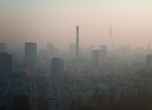
Posted: Wed Mar 23 2011
Anybody conspicuously foreign who happened to be in Tokyo last weekend might have noticed a curious phenomenon: the look of mild shock that registered on people's faces when they saw that you were still here. In a week that was marked by all kinds of rumours and misinformation, one story persisted. Foreign residents, apparently, were fleeing the city en masse.
'Thousands swamp immigration,' reported The Japan Times on March 17, observing the huge lines of people applying for re-entry permits at the Tokyo Regional Immigration Bureau. 'Crisis Triggers an Exodus from Tokyo' splashed the Wall Street Journal a day later. Even the more conservative embassies recommended that their citizens at least 'consider' leaving the capital; many went as far as to charter flights out of the country.
As the mood grew increasingly acrimonious, some clever-clogs coined a word for the people departing: 'flyjin', a combination of 'fly' and 'gaijin'. The nastiness of the term – a national crisis is hardly the time for playground taunts, is it? – was matched only by its inaccuracy. 'A lot of Japanese people left, too – surely more than the number of foreigners,' says Sandra Barron, who caught a 2am flight from Tokyo to the US on March 18. 'I'm not sure why the debate is in terms of gaijin who left, rather than people who left.'
A web-savvy writer and technical editor, Barron had stayed in Tokyo for a week after the earthquake first hit, providing valuable coverage and commentary via her Twitter account. When she began to consider leaving herself, she says, 'the biggest factor was distraught family members.'
'We went to bed late Wednesday night having assured them that the UK scientific adviser said there was absolutely no reason to worry for anyone outside the 20km exclusion zone. We woke up the next morning to [find] the zone quadrupled to 80km and a suggestion from the UK to consider leaving. Still, no material change to the facts in Tokyo, but the seeming abruptness and magnitude of the change made it feel like things were moving in the wrong direction.'
Journalist Richard Smart had been spooked by similar developments earlier in the week. He left Tokyo with his Japanese wife on the afternoon of March 15, taking the shinkansen to Kyoto; like many of the people we spoke to, he's since returned.
'I basically followed the plan I had made for what to do in the case that the big one struck,' he says. 'The constant tremors and opaque news briefings that were taking place at the time were also worrying. But the main factor for us was that we could both continue working just as well from Kansai, I guess. If my wife had had to go to work every day, or I didn't work from home, we would probably have stayed.'
For others, the choice was more instinctual. 'My daughter is 10 years old, and I simply couldn't see letting her remain in Tokyo under threat of potential exposure to radiation,' says musician Samm Bennett. 'No way.'
One thing that's missing from these accounts is a sense of panic – the kind of bug-eyed fear that might justify talk of 'fleeing' rather than simply, well, leaving. Far from rushing blindly for the nearest emergency exit, the so-called 'flyjin' were usually making informed decisions, paying attention to sources of information besides the soothing spiel being relayed by NHK.
'The Japanese media doesn't do a lot of digging for itself,' says journalist Daniel Robson. 'The foreign media is currently being scapegoated by the domestic press for creating panic, but for me it was the opposite. I know the Eggman-citing Fox News reports are not ever worth listening to, but the same can be said for the majority of the line-toeing, kowtowing Japanese outlets, which frankly are a disgrace to true journalism.'
Robson headed to Osaka with his Japanese wife and her parents on March 14, returning a week later. 'I do think it's going to be quite stressful for a few months,' he admits. 'But I have a live event lined up on the 26th, which will now be a fundraiser, so I wanted to make sure that goes ahead.'
As life slowly gets back to normal, though, some of the recriminations linger on. It's not just the 'flyjin' thing, either: Twitter and Facebook have been rife with casual sniping all week, while some local celebrities have waded into the debate. 'Foreigners who want to go home, piss off home!' wrote footballer-turned-TV celebrity Ruy Ramos on his Japanese-language blog on March 18. In the March 20 edition of TV show Akko ni Omakase, meanwhile, presenter Akiko Wada questioned why foreign residents had left rather than accept the government's reassurances that Tokyo was safe. (Update: We've since learned that Wada was actually interested in whether foreigners knew something that the natives didn't.)
'All the animosity against people who left town was disappointing: questioning the integrity and intelligence of someone simply for being cautious,' says Jason Jenkins, a writer and producer who headed to Kansai for a week with his wife and two young children. 'I took it personally at first, but decided to let it go – there's enough tension going around as it is.'
'In retrospect, it was nice to be away from aftershocks, blackouts and diminished train schedules for a week,' he says, now back in the capital again. 'Tokyo wasn't dangerous then and it's not dangerous now. But in the uncertainty of the moment, I made a decision and I'm sticking by it.'
As for those who decided not to leave the city, it's worth dropping the Blitz analogies for a moment and asking yourself: what difference did it actually make? Was this ever really a question of courage, or of not 'letting the side down'?
'People who've left Tokyo have not abandoned a disaster area, they haven't left behind wounded, sick or dying people who need their assistance,' says Bennett. 'They are merely doing their best to ensure the safety of themselves and their loved ones. And to anyone who has some particular problem with that, hey, you know... sorry, man.'
Tags:
Tweets
- About Us |
- Work for Time Out |
- Send us info |
- Advertising |
- Mobile edition |
- Terms & Conditions |
- Privacy policy |
- Contact Us
Copyright © 2014 Time Out Tokyo














Add your comment